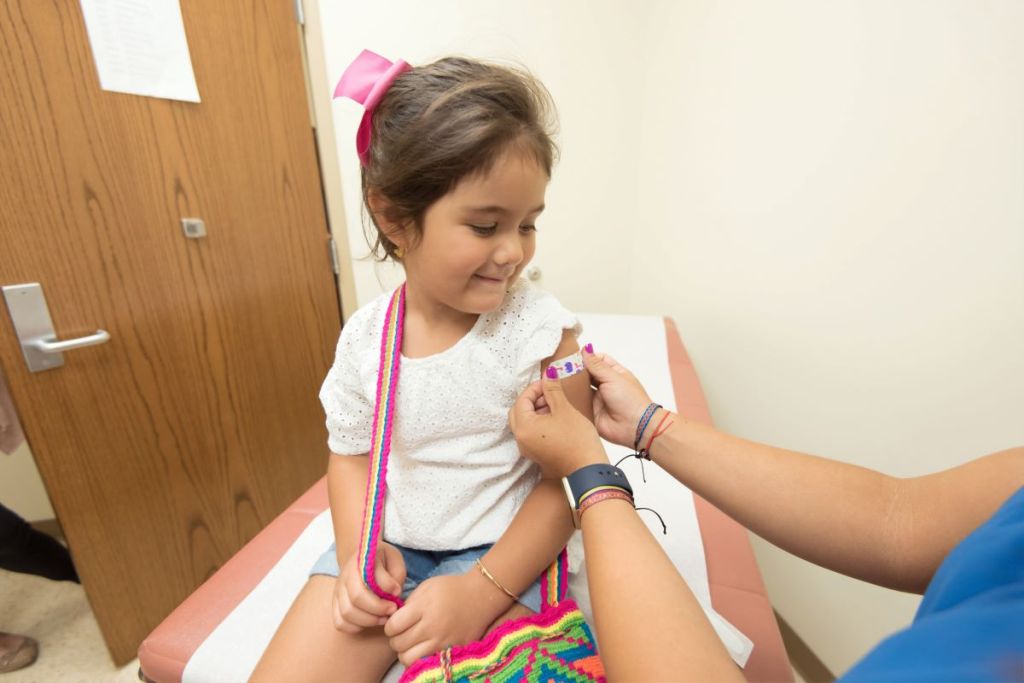From a minor yet irritable rash to full-blown anaphylactic shock, food allergies in kids can be quite scary. As a parent, you want to do everything possible to protect your child, and therefore knowing the symptoms of an allergic reaction is helpful. As you start introducing your children to solid foods, and as they try new things as they get older, you’ll need to be on the lookout for anything out of the ordinary.
Thus, we have more information about the symptoms, what causes these reactions, and what you can do if you find yourself asking, “Does my child have a food allergy?”

What causes food allergies in kids
Understanding the factors that trigger food allergies often helps with familiarizing yourself with the signs and symptoms. Basically, the body responds to the food by sending out antibodies to defend itself. In turn, this reaction causes histamines to be released which then triggers a variety of symptoms from a minor rash to stomach issues. In short, the immune system mistakes the food for an invasive enemy and unleashes its army of antibodies, chemicals, and histamines to attack it. Some of the most common offenders include:
- Milk
- Peanuts and/or tree nuts
- Soy
- Eggs
- Wheat
- Fish and/or shellfish
Some children “outgrow” food allergies, while others deal with them for the rest of their lives.
Does my child have a food allergy?
Gaining an awareness of the symptoms and consulting with your pediatrician with any questions or concerns can put you ahead of the game when it comes to detecting any food-related issues.
Some of the symptoms of food allergies in kids include:
- Redness of the skin
- Hives
- Eczema
- Sneezing
- Itchiness in the mouth, tongue, lips, or throat
- Dry cough
- Runny nose
- Stomach pain
- Nausea
- Diarrhea
- Vomiting
- Dizziness
- Hoarseness
If these symptoms occur often, and you suspect that each incident correlates directly with a certain food, then you can contact your pediatrician to see if your child needs to be tested for a possible allergy.
More severe symptoms to watch for
Also, some symptoms of food allergies in kids present as more severe cases where you would need to call 911 or go to the emergency room immediately. These include:
- A feeling of closing or tightening of the throat
- Trouble breathing and shortness of breath
- Swelling of the face, tongue, throat, and lips
- Severe nausea, vomiting, and diarrhea
- Trouble talking
- Feeling lightheaded, disoriented, or dizzy with a drop in blood pressure
- Fast, weak heartbeat
- Seizure
- Moist, cold, or light blue skin
- Loss of consciousness
A combination of breathing issues, swelling, and dizziness could signal anaphylaxis which is a severe reaction that involves multiple systems in the body. In this situation, you need to call 911 immediately. Another important aspect of allergic reactions to remember is that some symptoms start off mild and can progress rapidly. So, erring to the side of caution is always best.
Symptoms in babies and toddlers
In babies and younger toddlers, symptoms of an allergic reaction can be similar to those mentioned, but here are a few that differ slightly:
- Blood in the baby’s or toddler’s stool
- Poor growth
- Persistent eczema that doesn’t go away
- Constant colic and fussiness
While these symptoms don’t always translate into an emergency, you should still consult with a doctor and an allergist for an accurate diagnosis and prompt treatment.

How are food allergies in kids diagnosed and treated?
Luckily, your pediatrician has a head start towards obtaining a diagnosis since they have your child’s complete health history. Aside from that, you might need to provide a brief food journal or list of foods, snacks, and drinks that your child has taken for a week or more. Additionally, the doctor might refer your child to an allergist and/or order any of the following tests:
- A blood test or RAST (radioallergosorbent test) to measure the number of IgE antibodies that are released upon exposure to certain, possible allergen
- A skin prick test that involves exposing the skin to the allergen but is not used if your child had a severe reaction
- The food challenge test, which is administered only by an allergist by mouth or inhaled, and the child is closely watched for a reaction
One thing to keep in mind is that the food challenge is administered mostly when the allergist thinks that your child will outgrow the allergic reaction and might be able to take the food again that was causing the reaction. Likewise, the only drawback to the blood and skin prick tests is that they won’t tell how severe the reaction will be. However, running any one or a combination of these tests will either diagnose the issue or rule out the possibility of a food allergy.
What about treatment?
Treatment also comes in different forms from dietary changes to treatments for the symptoms themselves. For the more severe cases of food allergies where anaphylaxis might occur, doctors might also prescribe epinephrine autoinjectors, also known as “epi-pens.” In this situation, you would always need to carry two pens with you, and if your child is already in daycare or school, then the nurse would need to have two on hand as well.
Food allergies in kids can be unnerving if you’re familiar with the common allergens or the symptoms. However, now that you’re armed with this information, you know what to look for and most importantly, what to do and when to call the doctor.
Editors' Recommendations
- 25 creative journal prompts for kids
- Heads up, 7 up: What’s the game and how to play it
- How much water should a 1-year-old drink? What you need to know
- The feeling words all parents should teach their little ones
- What it means if you lose weight during pregnancy – and when to worry




